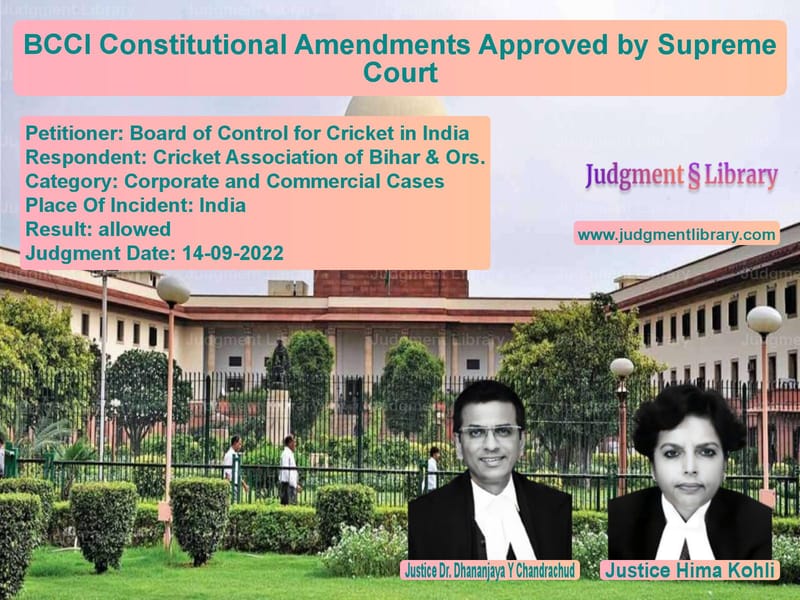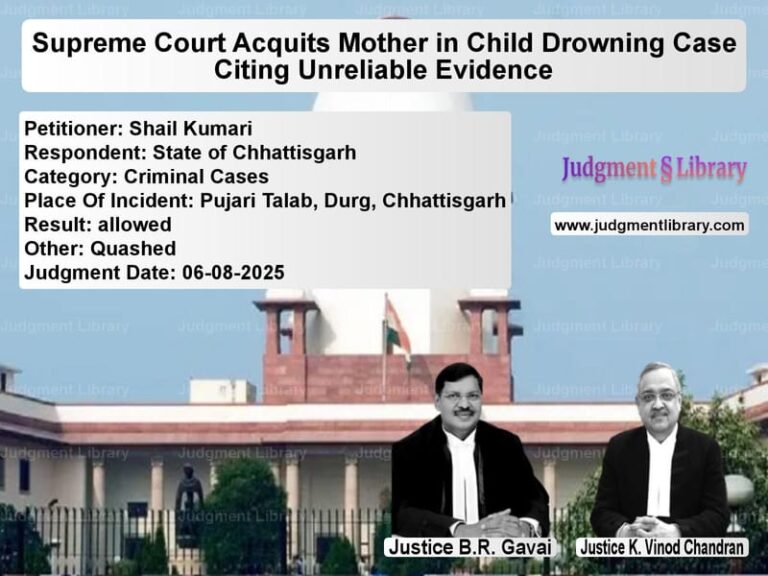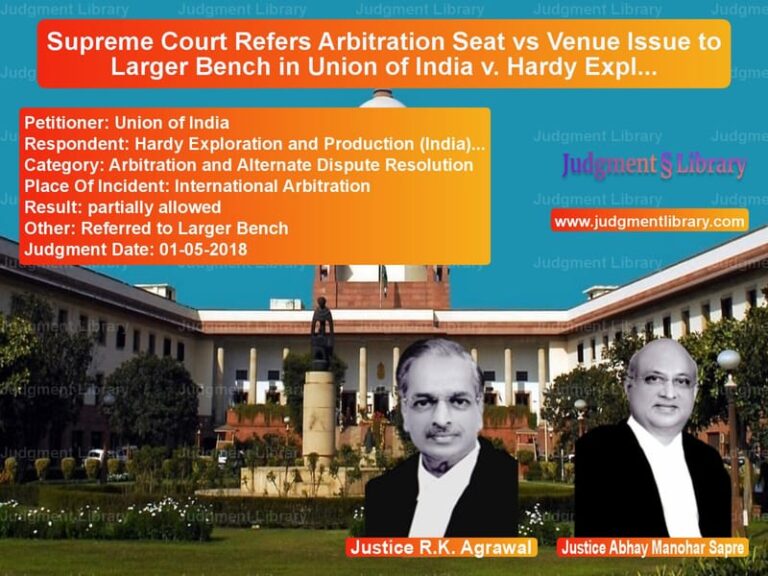BCCI Constitutional Amendments Approved by Supreme Court
The Supreme Court judgment in the case of Board of Control for Cricket in India (BCCI) vs. Cricket Association of Bihar & Ors. involved a crucial decision regarding the governance of cricket in India. The Court addressed proposed amendments to the BCCI’s Constitution, particularly focusing on the cooling-off period for office bearers, and the role of the BCCI’s governance. The key issue at hand was the cooling-off period that applies to those holding office within the BCCI and state associations.
Background of the Case
The matter initially began with a judgment in 2018 in the case Board of Control for Cricket in India v Cricket Association of Bihar, which approved a draft Constitution for the BCCI. A provision was included in the Constitution stating that no amendments would be effective without the leave of the Supreme Court. This provision was aimed at ensuring that the purpose of the reforms in the governance of cricket was not diluted or undermined by hasty or inappropriate changes.
The Cooling-Off Period Provision
One of the significant provisions in the BCCI Constitution was Clause 6(4), which stipulates that an office bearer, after serving two consecutive terms in a state association or the BCCI, must undergo a cooling-off period of three years before contesting elections again. This cooling-off period aimed to prevent the concentration of power in a few hands and to ensure a regular turnover of leadership in the cricketing administration.
Proposed Amendments
In 2019, BCCI proposed several amendments to the cooling-off provision. The changes were focused on the distinction between positions at the state level and the national level, suggesting that the cooling-off period should only apply after two consecutive terms at the same level, either at the state association or at the BCCI. The amendment also proposed to restrict the cooling-off period to specific positions like the President and Secretary, while other positions could remain exempt from this cooling-off rule.
Arguments and Submissions
The Solicitor General, Mr. Tushar Mehta, representing the BCCI, submitted that the cooling-off period after one term at the national or state level was too stringent and that the amendment should apply only after two consecutive terms at the same level. This view was based on the argument that the roles and responsibilities at the state level and national level were distinct, and therefore, the cooling-off period should only apply after an individual has served consecutively in the same capacity either in the BCCI or a state association.
Mr. Maninder Singh, senior counsel assisting the Court as an amicus curiae, argued against this modification, suggesting that the cooling-off period should apply universally to all office bearers, not just to the President and Secretary. He emphasized that the principle of the cooling-off period was essential for ensuring broad-based leadership and preventing monopolies in the administration of cricket.
The Court’s Consideration and Decision
The Court considered both the submissions and the reasoning behind the proposed amendments. The Court recognized that the cooling-off period was an essential safeguard against the concentration of power and vested interests. It also acknowledged the distinct nature of the functions performed at the state and national levels, which justified the modification to the original provision.
After deliberation, the Court agreed with the proposed amendments, incorporating suggestions from the amicus curiae. The amendments were deemed to be in line with the original purpose of the cooling-off period while also providing clarity regarding its application at both the state and national levels. The Court emphasized that the cooling-off period would still apply after two consecutive terms at either level, and the rule would remain in place to prevent any individual from monopolizing cricket administration.
Conclusion and Outcome
The Court also dealt with additional amendments concerning the disqualification of office bearers. These included provisions disqualifying individuals over the age of 70, those who are convicted of a criminal offense, and those who hold a public office. The Court accepted most of these amendments, but clarified that disqualification should be linked to convictions and not simply charges.
In the end, the Court accepted the amendments as proposed by the BCCI, with the changes set out in the third column of the tabulation that had been presented. The amendments were allowed to be implemented, with the stipulation that they should not undermine the objectives of the governance reforms.
Judgment Date: September 14, 2022
Judges: Dr. Dhananjaya Y Chandrachud, Hima Kohli
Petitioner Name: Board of Control for Cricket in India (BCCI)
Respondent Name: Cricket Association of Bihar & Ors.
Case Outcome: Petition Allowed
Place of Incident: India
Original File Name: 24114_2013_2_21_38182_Judgement_14-Sep-2022.pdf
Total Characters in File: 34372
Petitioner Name: Board of Control for Cricket in India.Respondent Name: Cricket Association of Bihar & Ors..Judgment By: Justice Dr. Dhananjaya Y Chandrachud, Justice Hima Kohli.Place Of Incident: India.Judgment Date: 14-09-2022.
Don’t miss out on the full details! Download the complete judgment in PDF format below and gain valuable insights instantly!
Download Judgment: board-of-control-for-vs-cricket-association-supreme-court-of-india-judgment-dated-14-09-2022.pdf
Directly Download Judgment: Directly download this Judgment
See all petitions in Corporate Governance
See all petitions in unfair trade practices
See all petitions in Company Law
See all petitions in Judgment by Dhananjaya Y Chandrachud
See all petitions in Judgment by Hima Kohli
See all petitions in allowed
See all petitions in supreme court of India judgments September 2022
See all petitions in 2022 judgments
See all posts in Corporate and Commercial Cases Category
See all allowed petitions in Corporate and Commercial Cases Category
See all Dismissed petitions in Corporate and Commercial Cases Category
See all partially allowed petitions in Corporate and Commercial Cases Category







